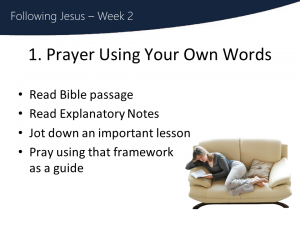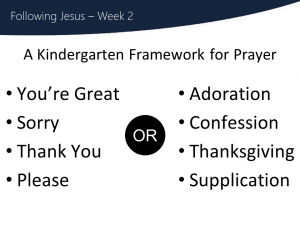 First, we’ll learn about prayer using your own words.
First, we’ll learn about prayer using your own words.
The first way I’d recommend praying using your own words is to pray while you read your Bible.
- Read Bible passage
- Read Explanatory Notes
- Jot down an important lesson
- Pray using that framework as a guide
 The second way I’d encourage you to pray is using a framework like this.
The second way I’d encourage you to pray is using a framework like this.
God does not want us to simply repeat meaningless words, he really wants to hear what is on our hearts. Having said that, many people find it helpful to have a pattern for prayer. This one is easy to remember, either because it’s all you learned in Kindergarten, or because you can remember these letters: ACTS.
A—adoration, or “You’re great!”. In any marriage, or close friendship, it is important to take time to say I love you. Think of the story of a woman who is starved for some sign of affection from her husband and so she in desperation finally asks “Honey, do you love me ?” The somewhat less than romantic husband replied “I told you I loved you when we got married. If it ever changes, I’ll let you know.” Every couple knows the importance of saying a simple, I love you……As followers of Jesus, when we take time like this with God we call it praise or adoration. We need to build time into our prayers to say I love you to God, and to nurture our growing relationship. We need to say how much we value the relationship, express our happiness at all we are discovering about God as we are becoming sensitive to God’s presence in our lives.
C—confession, or “sorry”. Saying we are sorry is necessary in even the strongest relationships. Sometimes we have to apologise for something we have said or done that has caused anger or pain. These words are not easy to say but if they are not spoken when they should be the relationship sustains serious damage…when said they can bring great healing and peace. The better we get to know one another, the better we realize what the words, issues or actions are that will introduce tension into the relationship…
This is a very important part of growing together and followers of Jesus take it seriously.
As we grow in our relationship with God we will find that old habits and attitudes are getting in the way (same as in marriage). It takes time to get comfortable with confession
T-thanksgiving, or “Thanks”. A relationship where people stop saying thank you is headed for serious trouble. This is an easy pattern to fall into. Unfortunately it is easy to take all that God gives us for granted as well. The simple truth is that God has created a world full of wonder and daily fills our lives with good things. Learning to say thank you on a regular basis is a surefire way to develop and strengthen our friendship with God. Begin with the obvious—say grace, as you sit in your house, however simple, thank God that you have shelter. You will be amazed at how your awareness of things that you are thankful for increases—family, friends, work—the list is virtually endless. I am sometimes overwhelmed with God’s generosity towards me. You will also begin to see the world in a different way—signs of God presence and activity will appear all around you. You will also find that the dark and difficult spots in your life will be seen in a new perspective. They wont disappear, they might not even by diminished, but you will know that there is a lot more to your life than those dark spots.
S—supplication or “Please”. Making requests of God is certainly a legitimate aspect of prayer. On several occasions Jesus encouraged us to do so. In a loving relationship it is entirely in order and natural for partners to ask each other to do things or to give things to one another. This aspect of prayer however, should be based on our growing desire to live lives that are pleasing to God. As this happens, we are more and more able to bring to God requests that are in keeping with God’s vision and which will bring the prayers closer to becoming a reality. Such prayer is far removed from self centered shopping lists.
This really can help you keep your prayers balanced – so you’re not only asking for things, but ensuring there is an ongoing relationship that is regularly communicated to the other party!
Question: Which part of the ACTS outline will you find hardest to pray? Why?
